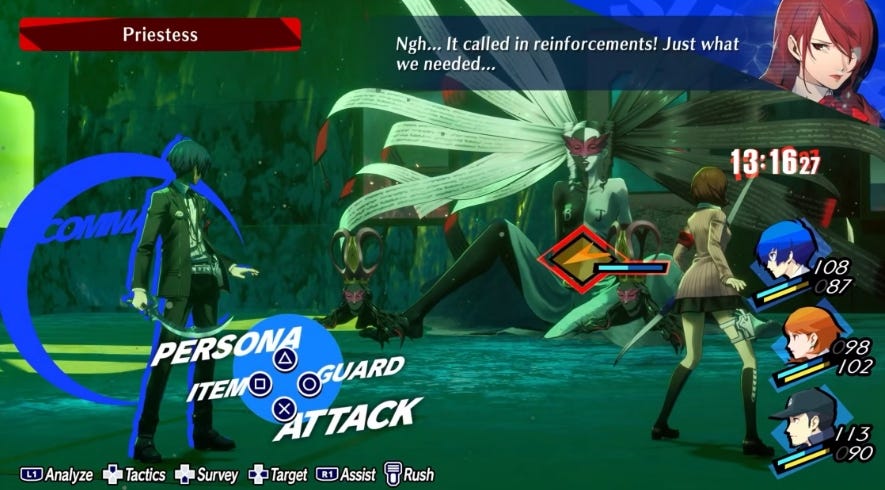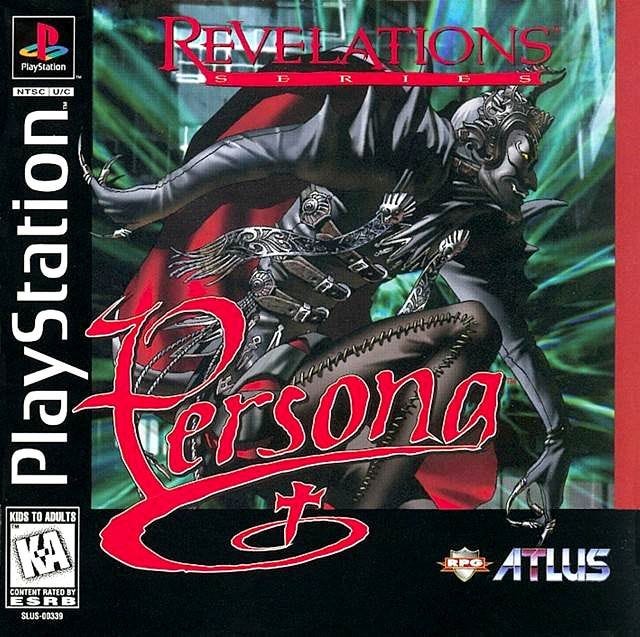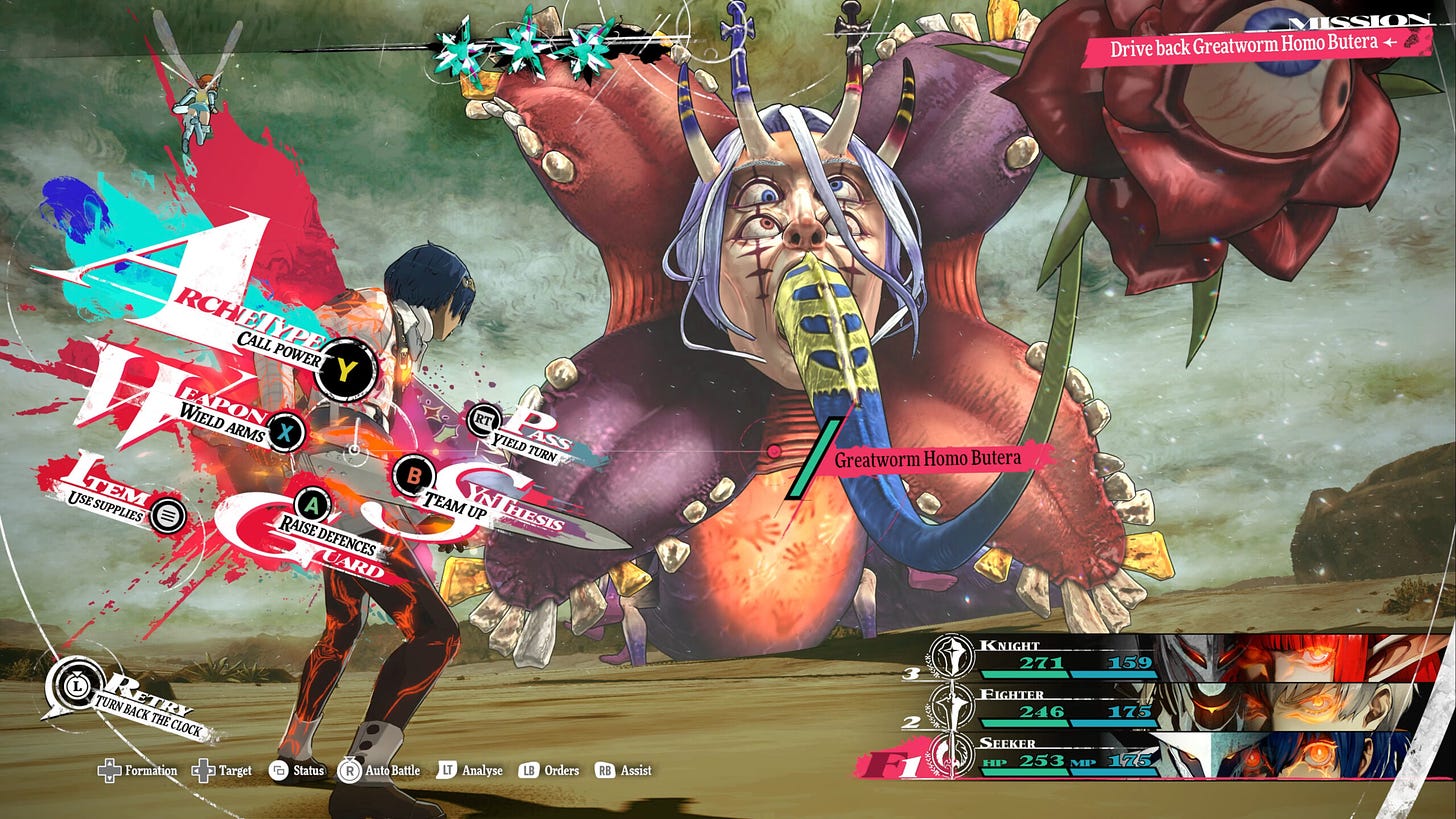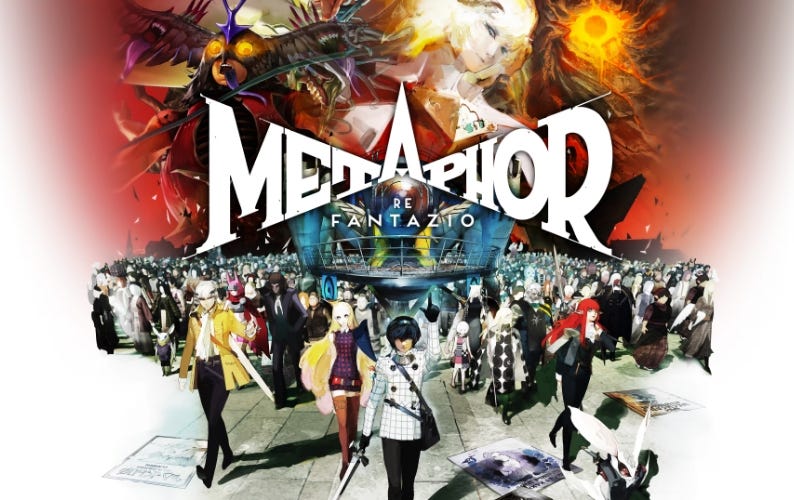Is it time for Persona to grow up?
Metaphor Re:Fantazio makes the case for big sister to finally get that diploma.
I’ve been playing the Persona series for a long time - ever since I picked up a copy of Revelations: Persona for the PlayStation from a drug store bargain bin. This was more than twenty years ago! As a tween, I found the game to be so edgy, featuring a high school and town surrounded by witchcraft and techno-demons. I was at the start of my Buffy the Vampire Slayer fandom, so it felt like this game was tailor-made for me. Likewise with Persona 3. I was in college when the game released for the PlayStation 2 but could still relate with its themes and characters.
I’ve been a dutiful soldier since, a fan of the Persona games but also its parent series, Shin Megami Tensei. I enjoyed this year’s Persona 3 Reload and it’s refreshed presentation of the original game. More recently, I’ve been able to play some of the sublime Metaphor Re: Fantazio. While playing, I keep coming to the same conclusion: Man, I really wish Persona would grow up.
Revelations: Persona was released in 1996, its western debut more or less serving as the premiere of Shin Megami Tensei in the United States. The game has players controlling a group of students at St. Hamelin High who are granted the power to summon Personas, manifestations of each character’s personalities. From there, they investigate the source of the demonic invasion in their town, ultimately tying it to the corporation which all but runs the town. The game features first-person dungeon crawling and turn-based combat where you interact with monsters, with the ability to fuse and create new Personas. Think Pokémon, except a little more Satanic. If the students aren’t summoning Personas or engaging in melee combat, they can use an inexplicably accessible firearm in battle.

When the series made the transition to PlayStation 2 with Persona 3, it adopted a stylish, eye-catching art style, jazzy combat themes, and included a social sim aspect through Social Links, which continue to be a series staple. Social links reflect the deepening relationships forged by the main character, which in turn provide bonuses and other buffs when fusing Personas of the same type. Although the series continued to gain steam with Persona 3 and 4 - and their many offshoots - it seemed Persona 5 continued to capitalize on that zeal, with numerous spinoffs including a recent strategy RPG.
Shortly after the release of Persona 5, director Katsura Hashino formed a new team within Atlus called Studio Zero, and the game that would eventually be known as Metaphor: ReFantazio was announced as Project: ReFantasy in December 2016. Nearly eight years later, Metaphor was released to nearly universal acclaim, selling a million copies in its first day of release and becoming one of the biggest game launches for Atlus.
Metaphor opens in the kingdom of Euchronia, reeling from the King’s assassination. He is murdered by Louis Guiabern, a military general expecting to utilize his military powers to take over the government. Instead, the King’s magic triggers the Royal Tournament - essentially a magical election requiring candidates to garner support across the land to be designated as the King’s successor. The main character participates in the tournament while working to take down Louis. My favorite part of the game thus far? There isn’t a high school in sight.
Don’t get me wrong: Persona is not immature by any means, as it boasts a deft juxtaposition of high school characters on the cusp of adulthood with adult themes and concepts, including the notion that the government or corporations are self-serving. Yet there is only so much “Notice me, senpai” one adult can take. Even in Persona 5, I felt one of the more relatable and interesting characters is Sae Niijima, the brassy Prosecutor who is also Makoto’s sister. The latent anxiety of growing up in an unjust world can just as easily be mined with adult characters and tensions. We don’t need storylines about mortgage rates or preschool admission, because there is plenty of material available to be Persona-ified: failing relationships, terminal or mental illness, ethical issues in the workplace, and so much more. It would be a subtle reframing of focus, rather than a chasm of change.
There are glimmers of this post-high school world hinted at within Persona, but also games tangentially related to the series. For instance, in the Persona 2 duology , one of the main characters is Maya Amano, an intrepid journalist who, at 23 years old, is one of the oldest playable characters in the series. There’s also Catherine, the puzzle game directed by Hashino and featuring much of the same creative team. Catherine specifically is centered around slacker Vincent, a 32-year-old who desperately needs to grow up. It’s very much designed with adults with a frank approach to sexual themes, fidelity and other adult entanglements - but with its Mature rating, aren’t the Persona games, too?

Metaphor is a step in that direction. The fantasy setting, political machinations and plot twists are buttressed by an incredible localization and presentation. It’s mechanically identical to its spiritual forebears: we’ve got SMT’s iconic Press Turn combat system and interesting twists on Persona’s social management simulations but divorced from some of the baggage of the parent series. From the opening cinematic, the stakes are very high in this dangerous, magical realm. It’s clear the creative team behind Persona wanted to take a medieval breather, and who can blame them.
It feels bracingly refreshing, even while your character is casting Tarukaja, a spell from SMT/Persona. Yet while I appreciate these trappings, it’s the modernity of the Persona games that is arguably its most exciting aspect. I don’t advocate for Persona to ditch its modern setting. Who doesn’t love exploring nigh-apocalyptic Japan? I just want to see more of it outside the confines of a high school courtyard.
Metaphor’s success - selling a million copies on the day of release, outpacing that of Persona 3 Reload - emphasizes the trust and respect the development team has garnered over the years. Many of us, regardless of age, have quite literally grown up with Persona. I’m personally a few hits away from 40, wondering if Persona 6 will be released in 2027. By then, I’ll be more than twenty years removed from high school. Will the characters I play still be there? Perhaps after six entries, it’s time to ditch the textbooks. Playing Catherine - and now Metaphor - it certainly feels as if the creative team wants to stretch their wings, at least from a narrative perspective. Why not let them do that within the Persona series, and allow for innovation yet again?

By embracing a storyline and cast set after high school, the next Persona game could also explore a wider age range for the cast. Sure, it could be set at a university, but that might feel too similar, almost like when your favorite show struggles to transition out of the high school seasons. Instead, Persona could examine the struggles of middle-life, some of which mirror those of young adulthood: self-fulfillment, familial obligations, and establishing one’s identity through a Jungian-tinted lens.
A character struggling with raising their child as a single parent? It might sound bleak, but this is very much the Persona wheelhouse. Except this time, the parent isn’t dead - they are the player character. This inversion would allow re-examination of many of the themes already explored. In Persona 4, we watched as Yukiko struggled under the weight and expectations of her family business and how it impacted her emotionally and academically. It would be interesting to see how the game would frame these same issues from the perspective of an aging parent who wants to find a way to provide for their children’s future without forcing them into the family business.
Before the pitchforks come for my Junes fan club card, I’ll remind you that I am also a fan. That’s kind of the point - fans of the series spread across all age ranges and demographic. Yet I am eager to see a Persona game that attempts to tackle the trials of adulthood. Featuring adult characters might resonate more deeply with long-time fans but also newcomers to the series who might balk at the high school setting.
A Persona game centered on adulthood could be relatable and cathartic, and an interesting new direction for the series to take. Sure, high school may be hell, but have you tried filing taxes?







Ive not played any of the persona games or any of theirs except Catherine. Reading on this makes me wanna dive right into metaphor first
I share your view on the Persona series. Metaphor is a step in a much more palatable direction. I play Persona for the mechs, music and interesting plot threads and ideas... not to simulate Japanese high school life. Metaphor had all of the above, and I didn't even have to Google answers for some silly trivia exam (is that really what they teach in Japan!?!) two-thirds through the game!
Another game series that needs a kick in this direction is Pokemon. I'd wager a lot of its fans are adults now. When are we going to get over the trope of playing a child (usually around 10) being released into the wilds to become the grand champion of Pokemon? It makes even less sense in the latest game.